How to Instantly Generate Blog Ideas from Keyword Research

If you are struggling to come up with solid blog ideas, it’s time to utilize keyword research data properly. Keyword research ensures you know where you are going with your content planning, as it lays the groundwork based on zamiar wyszukiwania użytkownika.
I’ll guide you about types of keywords that actually matter for ideation, and show you how to prioritize topics with business impact.
You’ll also get to see how advanced AI tools pull everything together. Plus, learn how to fetch different types of keywords to analyze competitor data and map relevant topics. So, let’s start!
szybki przegląd
To generate blog ideas with keyword research, start with basics like using Google/Bing Autocomplete and PAA. Then analyze keyword types (intent, length, funnel stage, location, relevance) so you can shortlist smarter. Next, prioritize keywords by business fit, search volume/traffic potential, SERP competitiveness, and competitor coverage. Then, analyze competitor data, find content gaps, and cluster keywords in topical maps. Finally, you’ll be able to get blog ideas and write blogs. Helped by AI-powered tools and advanced SEO solutions.
Getting Started with Keyword Research
One of the earliest steps in the blog writing process starts with keyword research. Researching keywords helps you understand what users are searching for on the web. As well as what your competitors are ranking for.
A quick way to begin keyword research is to enter words or groups of words in the Google, Yahoo, Bing, Yandex, etc. search bars. This traditional method lets you check which keywords are popular on the SERP against your topic.
For instance, if you search the keyword “Keyword Research” using Google’s search bar, the Autocomplete feature of Google will give you a list of commonly searched phrases related to Keyword Research.

The same goes for searching on Bing or other search engines.
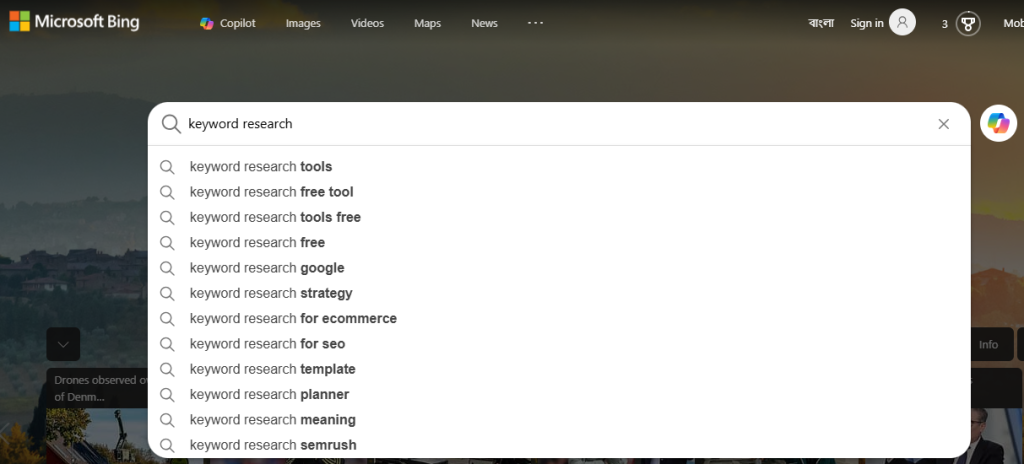
The popular searches based on your keyword will be the same across search engines. But it can vary region-wise and user profile-wise. That means, if you are searching on Google USA using Incognito Mode, the Autocomplete suggestions will be different than when searching logged into your Google account.
A faster, more efficient, and more effective way to perform Keyword Research to generate blog ideas is by using tools and plugins. There are countless Keyword Research tools online; many come as a feature of a more comprehensive SEO tool.
There are both free and paid tools for keyword research. But you should pick the ones that best suit your budget, needs, and use. Plus, with AI inclusion, the keyword research process is becoming faster and insightful.
Popular budget-friendly options include GetGenie, Ubersuggest, AnswerThePublic, ScreamingFrog, etc.
Types of Keywords
Performing keyword research requires understanding the different types of keywords and their uses. This analysis will help you eventually shortlist the right keywords for your blog posts and generate an effective blog.
| Types of Keywords for the Topic “SEO Keyword Research” | ||
|---|---|---|
| Keyword Parameter | Typ słowa kluczowego | Keyword Example |
| Intent | Informational | How to reduce churn |
| Navigational | Zaloguj się do GetGenie | |
| Commercial | best SEO plugin for SMEs | |
| Transactional | Get the Free keyword tool | |
| Długość | Short-tail | SEO-AI |
| Long-tail | SEO tools for retail teams | |
| Funnel | Top-of-Funnel (TOFU) | What is keyword clustering |
| Middle-of-Funnel (MOFU) | keyword clustering tools | |
| Bottom-of-Funnel (BOFU) | Buy a keyword clustering tool | |
| Location | Local/geo-modified | seo agency New York |
| Language/region variant | Analysing SEO” (UK) vs “Analyzing SEO” (US) | |
| Relevancy | Powiązane słowo kluczowe | missing keywords |
| NLP | keyword analysis for seo | |
| Semantic | buyer intent keywords | |
Prioritizing Keywords
Knowing the types of keywords will help you prioritize the ones to focus on for your ideation. You should focus on the keywords that:
- Fit your intent or business goals
- Have good search volume
- Not very competitive on the SERP
- They are relevant but not covered by competitors
Popular tools like GetGenie, Semrush, Ahrefs, Ubersuggest, AnswerThePublic, etc, help you prioritize your keywords for blog ideas. Another way is using Google Keyword Planner and Google Trends to get a solid estimate of what’s trending on the net.
Besides these, you can also consider the fact that 52.65% of Google searches were informational in 2024. It indicates that people are seeking information about a topic of interest or need more frequently.
Understanding Keyword Research Data
Before you begin generating blog ideas using keyword data, you must first understand how to interpret it. AI SEO, GEO, AEO, etc., are becoming popular search optimization methods. Thanks to AI, you will need to understand what the features of various tools represent.
Common metrics include search volume, keyword difficulty, CPC, and position changes. However, with the different types of keywords with different search and use intent, there are other metrics you must understand.
A tool like PobierzGenie will show you important keyword data when you start writing using its AI blog generation tool. Known as Blog Wizard, this useful feature of GetGenie lets you create blogs, driven by AI SEO.
Semrush has made a name for itself in providing keyword research analytics. Using its Keyword Magic Tool, you will get deep insights into multiple keywords across the globe. Though it’s a bit expensive.

Advanced tools go into more detail, showing categorized insights for Search Volumes or Position Tracking. Whether it’s for keywords you don’t rank for anymore or new keywords you should start ranking for, these tools guide you toward more in-depth insights.
Steps to Generating Blog Ideas
Now we will look at a step-by-step process of generating blog ideas using keyword research. We will use the keyword “AI tool” as our seed keyword.
Analyze User Search Intent
The first thing you will need to do is check how users are searching for “AI tools”. To understand that, we’ll use the tool GetGenie and its Keyword Research feature. We’ll enter the WP Dashboard > GetGenie > Keyword Research. There, we’ll type in “AI tools” in the textbox below “Your Primary Keyword Data” to fetch the data.
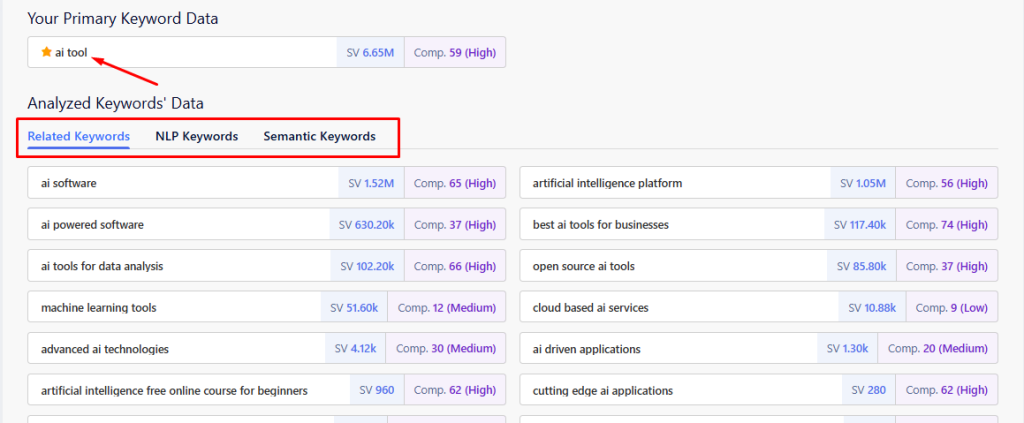
GetGenie groups the results in three categories: Related, NLP, and Semantic. Across all regions. Here, you can see metrics like Search Volume and Keyword Competition level of the secondary keywords, besides their names.
Related keywords show commonly searched terms alongside your main keyword that reflect user intent. The list derived here includes search terms like machine learning tools, advanced AI technologies, AI-powered software, etc., indicating keywords similar to the seed keyword.
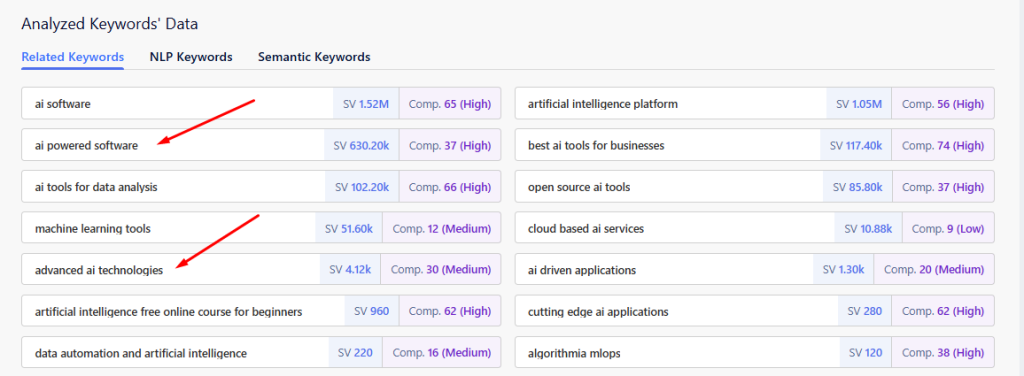
Again, you can use NLP and semantic keyword suggestions and list them down for blog generation ideas.
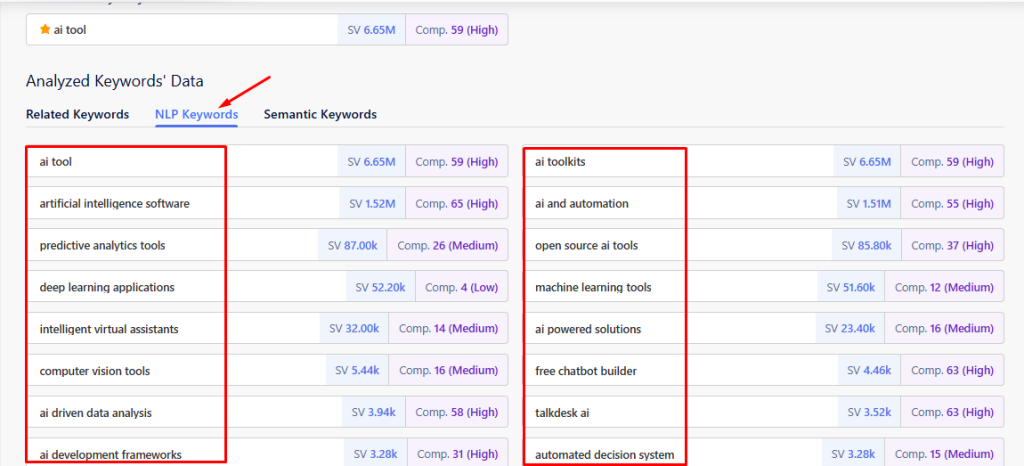
Here, some NLP keywords, terms that Google’s NLP algorithms identify as important from top-ranking pages, include:
- Artificial intelligence software,
- Intelligent virtual assistants,
- Computer vision tools,
- AI-driven data analysis, etc.
You can also take semantic keyword suggestions like:
- AI research tools
- AI software solutions
- process automation software
These types of secondary keywords tell you conceptually-connected terms that help provide depth & improve topical relevance.
Check Competitor Data
Next up, with some of the main topics, keywords, and secondary keywords selected, you can analyze how your competitors are performing for those keywords. Your analysis should consider how competitors are performing in the SERPs and how they compare with one another.
For the current example, you can enter an “AI tool” for a particular language (English) and region (USA), and see the results of competitor content.

As you can see, GetGenie lists the top-ranking content for the keyword in the USA. Plus, it also indicates how many words, images, and headings are used in each content. Plus, the competition level is also a good indicator of how much competitors are targeting this keyword.
For more advanced organic research on competitors, you can use Semrush. The Organic Research feature lets you compare and analyze SERP data for multiple top competitors. And the relevant keywords that you both are targeting and/or ranking for.
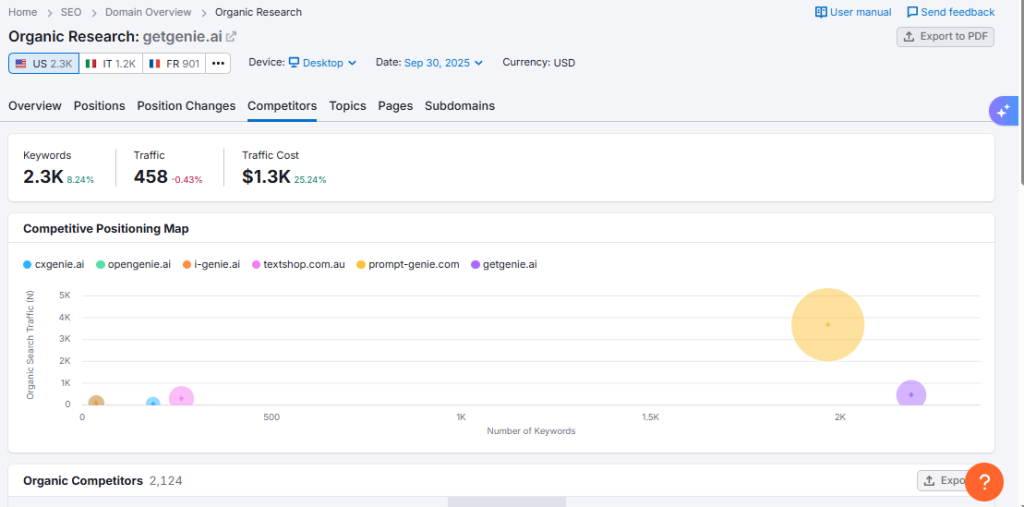
The above image shows 7 competitors who are targeting the same keywords as you and how they are ranking in comparison to you. The graphical presentation lets you visualize where and how much effort you have to give to outrank your competitors for the keyword.
When you have the right type and amount of competitor data, you can work on finding where your competitors are lagging. Or, haven’t attempted to rank for. These could be keywords with high search volumes that competitors haven’t capitalized on. Or, topics that need to be covered
Find Content Gaps
You can also use the keyword data to find out where you are missing content. And also, where your content is performing poorly in comparison to others.
GetGenie’s SEO Insights lets you view, analyze, and understand the performance of your site and content across various times, dates, regions, and devices. It details where you are losing position for target keywords or where you have the scope to perform or outrank competitors.
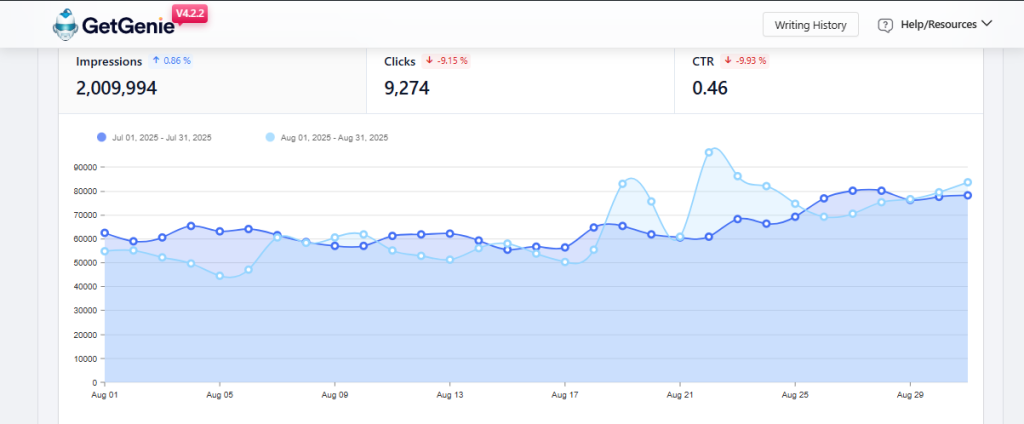
Then, you can track particular keywords against which you want comparative data. Plus, you can also find data on keywords where you have lost positions in the SERPs or are completely missing.
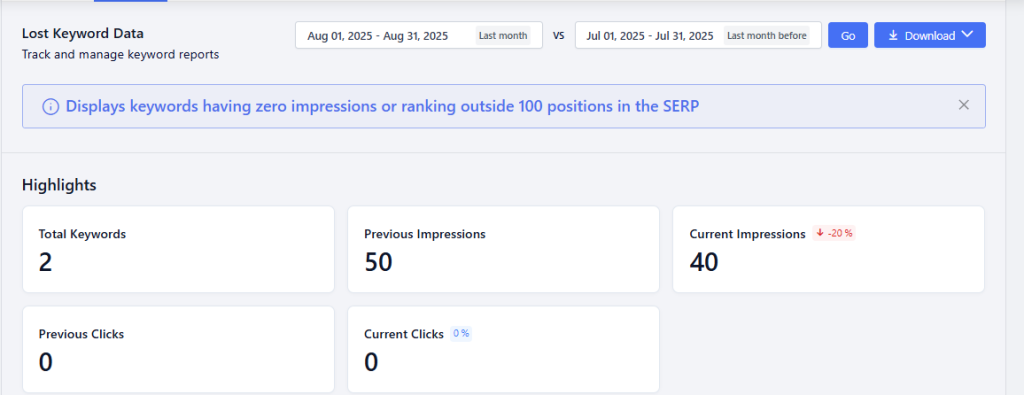
Map Keywords
Once you have researched relevant keywords, analyzed competitor data, and found any content gaps, now is the time to bring them all together to cluster or map the potential topics. You must chart how the shortlisted keywords and related topics to your main keyword sync together.
In such cases, topical or keyword maps help. These show clusters of keywords or topics mapped together to show their link to each other.
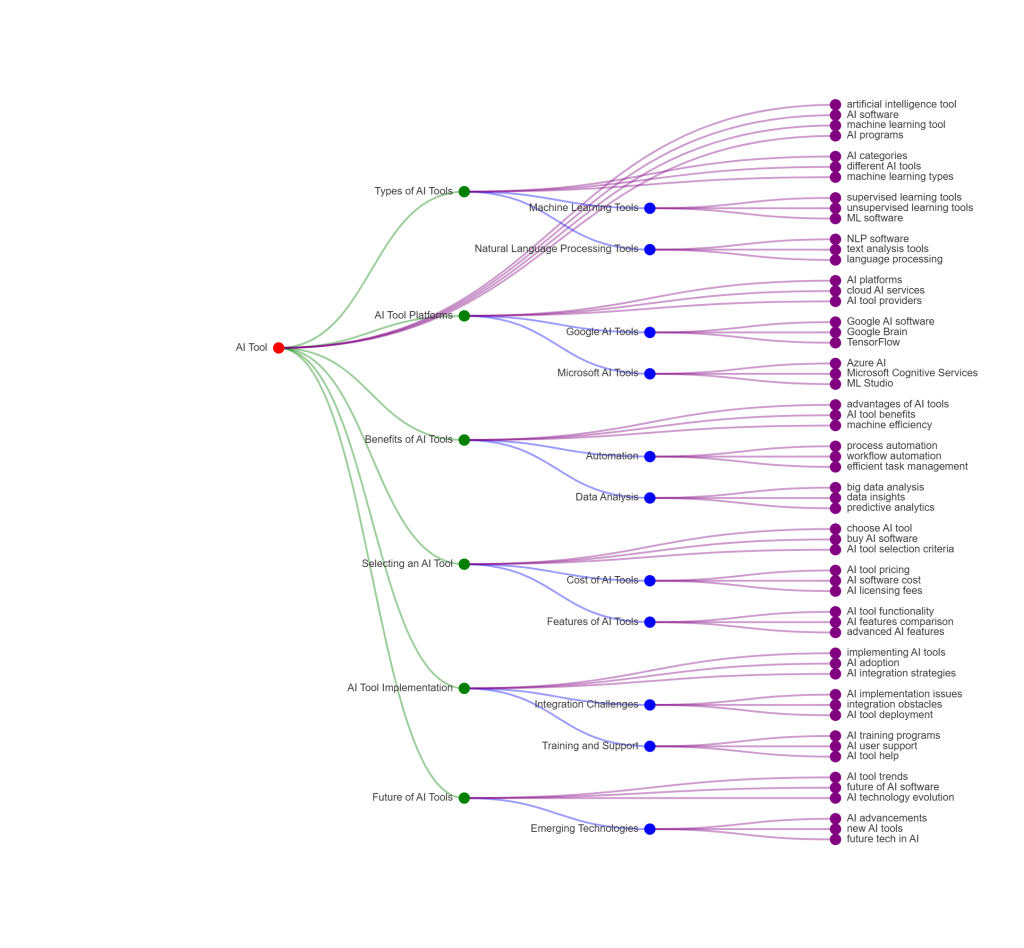
In the case of AI tools, the above map shows how topics like Benefits of AI tools, Selecting an AI tool, Google AI Tools, Data Analysis, etc., link to the seed keyword. And how you can use them for blog idea generation and organize them for a better blog. The clusters are grouped as main keywords and other levels.
You can also list and link keyword clusters or maps without any visual tool. Using just an Excel sheet, you can group keywords and find blog topics to work on. Check out an example below:
| Seed Keyword | Słowa kluczowe | Intent | Klaster słów kluczowych |
| Narzędzie AI | AI Tool Benefits | Informational | Process Automation |
| Narzędzie AI | Cost of AI Tool | Commercial | AI Tool Pricing |
| Narzędzie AI | Types of AI Tools | Informational | ML Software |
Create Blog Outline
With the keywords sorted out, headings initially finalized, and insights on how your content is performing, you are now ready to create your blog outline and blog ideas for your site. Though the blog topic ideas will come first, you can always keep the basic outline ready.
For the seed keyword AI Tools, you can list down topics like Benefits of AI Tools in the USA, Data Analysis with AI Tools, Top AI Software Solutions in 2025, Machine Learning Tools, etc.
To speed up and enhance your process, tools like GetGenie help you generate titles, topics, intros, outlines, and other parts of blogs, based on competitor data. It has a separate template, Title Ideas, that offers topic ideas based on AI-driven keyword research. Or, you can generate titles straight in its blog wizard, with more details shown.
You can also use information or details from Google’s People Also Ask, which is also directly integrated with GetGenie’s Blog Wizard > Analyze Keyword > Questions Asked. These help you learn popular queries and discussion points among the target audience.
Generate or Write Blog
Finally, when you have gathered and listed all details, you can generate your blog. You can do it manually, use AI tools for assistance, or directly generate a blog post with one click. Which you can edit, rewrite, update, and optimize later, as per your needs.
Benefits of AI-Powered Keyword Research
Content Planning driven by AI is extremely useful when you need to do faster research, get quick topic ideas, scale consistently, and better prioritize data. Using top content ideation tools like GetGenie, ChatGPT, Copy AI, Gemini, backed by keyword research solutions like Semrush, Ubersuggest, AnswerThePublic, etc., helps you expedite blog idea generation and content planning.
Dramatically faster research and ideation:
AI SEO tools help you expand seed topics into clusters, surfacing questions from SERPs, and turning briefs into draft outlines. So you move from “idea → brief → draft” in minutes instead of hours or days.
Scale consistently, without sacrificing relevance
You create more posts, content variants, localized versions, etc., while staying on-brand. Industry reporting and analyses point to automation of routine production and personalized content as core AI benefits, enabling you to create more while maintaining quality.
Better prioritization through data
Keyword research driven by AI helps you rank topics by business potential, intent fit, difficulty, and trend. So you publish what’s likeliest to move the pipeline, not just what has volume.
Higher conversion potential through personalization
As an analyst or specialist, you can use AI to enhance content & user experience. That is by guiding decisions and tailoring messages at scale. This will lead to more relevant experiences and stronger performance.
Często zadawane pytania
How can you prioritize keywords before writing?
The process is simple. First, ask yourself, does it naturally lead to your product/solution? Then, what is the traffic potential of the keyword? Next, are competitors competing for it? Finally, are you already ranking for it?
Should I chase high search volume or “traffic potential”?
Go for traffic potential. It gives you a combined demand you can capture by targeting a cluster (parent topic + closely related queries) in one strong article. A mid-volume keyword with many related queries often outperforms a single, big-volume term.
What are popular tools I can use to generate Blog ideas?
Some popular and tested tools include:
- PobierzGenie
- Ubersugestia
- OdpowiedźPubliczność
- Semrush
- CzatGPT
- Bliźnięta
These tools offer varying degrees of in-depth insights and features to help you improve blog idea generation and writing.
How do People Also Ask (PAA) and Autocomplete help with ideas?
You can use these features of Google to pick the right headings and FAQs. These also help you spot user intent and identify topics competitors have not covered yet.
Podsumowanie
Using keyword data for blog ideation requires proper planning, using the right tools, and shortlisting appropriate keywords. Your prioritized keywords must have the right intent, reflect traffic potential, follow current trends, and meet your business needs.
The right tools with the right keyword research features will help you consistently come up with new, effective blog ideas. You must also identify content gaps to tap into from competitors, using these tools. And with AI integration, the work will become a walk in the park.

